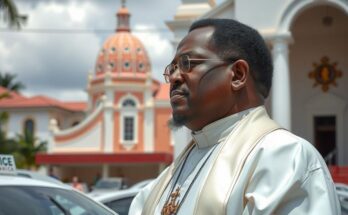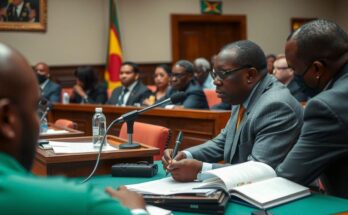President Kais Saied of Tunisia is projected to achieve a landslide victory in the presidential election, garnering 89.2 percent of the vote as per exit polls, despite a markedly low voter turnout of just 27.7 percent. His opponents are largely marginalized, with significant criticisms regarding the legitimacy of the electoral process. Saied’s rule has been characterized by increasing power consolidation and ongoing economic difficulties.
In Tunisia’s presidential election, President Kais Saied is projected to secure a significant victory with 89.2 percent of the vote, according to an exit poll broadcast on state television on Sunday. This anticipated outcome would solidify Saied’s position, having already consolidated his power in 2021 following a controversial suspension of parliament and a constitutional overhaul. However, the election was marred by notably low voter turnout, with only 27.7 percent of eligible voters participating, starkly contrasting the 49 percent seen in the previous election cycle in 2019. President Saied faced two challengers during this election: imprisoned businessman Ayachi Zammel and former ally Zouhair Maghzaoui, who has since adopted a critical stance toward Saied’s governance. Despite the presence of these opponents, their marginalization and Saied’s prior dismantling of parliamentary systems may have rendered the contest largely ineffectual. The election drew criticisms from opposition groups, who decried it as a sham and encouraged voters to abstain. By the end of voting hours, only about 2.7 million of the 9.7 million eligible voters had registered their ballots, indicating widespread disenchantment with the electoral process. Furthermore, although a number of candidates expressed aspirations to contest the presidency, only three were permitted by an electoral commission that operates under the president’s authority. President Saied, who ascended to power in 2019 by leveraging public discontent with the legacy political class, has transformed Tunisia’s political landscape through significant executive actions that opponents have labeled autocratic. The nation currently grapples with severe economic challenges, including a public debt surpassing 80 percent of its GDP and a current account deficit exacerbated by rising global inflation and the fallout from the Russia-Ukraine conflict. Saied maintains a firm stance against foreign intervention and promises that he will only pass leadership to individuals he deems patriots.
The context surrounding the 2023 presidential election in Tunisia is rooted in a tumultuous political landscape that emerged after the 2011 Arab Spring. The revolution catalyzed aspirations for democracy; however, subsequent governments have struggled with corruption and ineffective governance. Kais Saied, becoming president in 2019, initially attracted support as a reformist but has increasingly faced allegations of authoritarianism following his suspension of parliament and rewriting of the constitution in 2021. His administration grapples with significant economic challenges, including high public debt and inflation concerns that have contributed to public discontent and growing voter apathy.
In summary, the 2023 Tunisian presidential election reflects a troubling trend towards political disenchantment, characterized by low voter turnout and allegations of electoral manipulation. With Kais Saied poised for re-election amidst significant challenges, including economic decline and opposition boycotts, Tunisia’s democracy remains precariously positioned. The situation underscores the ramifications of concentrated political power and the ongoing struggle for genuine representation within the nation’s political framework.
Original Source: www.middleeasteye.net




